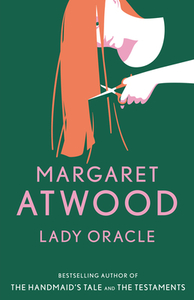Take a photo of a barcode or cover
challenging
dark
mysterious
tense
slow-paced
Plot or Character Driven:
Character
Strong character development:
Yes
Loveable characters:
Yes
Diverse cast of characters:
No
Flaws of characters a main focus:
Yes
Atwood wrote a light and intriguing meditation on the writing process and the nature of identity, but she disguised it as a cheap, fun, plot-driven, airport novel. I loved every delicious bit of it.
Lady Oracle was Atwood's third book and its clear how much of it turned out to be practice at things she'd do better in other novels.
Non-linear time lines. Check.
Multiple identities. Check.
Novels within the novel. Check.
Childhood bullies. Check.
Spiritualism. Check.
Impending sense of doom. Check.
Between Cat's Eye, Alias Grace and Blind Assassin, 1/2 of this book is covered. And that list only includes things from the other Atwood books I've read! There are so many more I haven't read. Parts of chapter 6 could have fit directly into Cat's Eye with only name changes!
In all my rating is a solid ★★★
Entertaining and engaging, but not the spectacular that I keep hoping for based on my love of A Handmaid's Tale and Alias Grace. Like Cat's Eye, I'm left feeling pretty ambivalent. I think I'll take an Atwood break for a while, but I will of course come back to her.
Non-linear time lines. Check.
Multiple identities. Check.
Novels within the novel. Check.
Childhood bullies. Check.
Spiritualism. Check.
Impending sense of doom. Check.
Between Cat's Eye, Alias Grace and Blind Assassin, 1/2 of this book is covered. And that list only includes things from the other Atwood books I've read! There are so many more I haven't read. Parts of chapter 6 could have fit directly into Cat's Eye with only name changes!
In all my rating is a solid ★★★
Entertaining and engaging, but not the spectacular that I keep hoping for based on my love of A Handmaid's Tale and Alias Grace. Like Cat's Eye, I'm left feeling pretty ambivalent. I think I'll take an Atwood break for a while, but I will of course come back to her.
Joan Foster is a writer of Gothic romances, her story begins with the decision to start a new life, then we know about her childhood and next continue to this time of her life in which the situation get out of control.
Maybe running away from reality and difficulties are not a very logical decision, but I admire the people who easily can give up everyone and gave up everything, live their own lives, and don't care about what others say. So, I think Joan is something like this in a good way.
This book reminded me of the CAT's EYE with a small mystery. LADY ORACLE was a little different, maybe because of the dark comedy that I never read in Atwood's works. If there was not a too much-threatening stalker, this book became one of my all-time favorites. But I should say I was impressed with the mother-daughter relationship and liked the character of Aunt Lou. So I can say it was an interested and enjoyable book. Something pleasant to read.
Maybe running away from reality and difficulties are not a very logical decision, but I admire the people who easily can give up everyone and gave up everything, live their own lives, and don't care about what others say. So, I think Joan is something like this in a good way.
This book reminded me of the CAT's EYE with a small mystery. LADY ORACLE was a little different, maybe because of the dark comedy that I never read in Atwood's works. If there was not a too much-threatening stalker, this book became one of my all-time favorites. But I should say I was impressed with the mother-daughter relationship and liked the character of Aunt Lou. So I can say it was an interested and enjoyable book. Something pleasant to read.
Iba con muchas expectativas y me ha decepcionado muchísimo. La primera mitad me parecía que nada terminaba de arrancar y la segunda mitad no me interesaban la mayoría de las cosas. La protagonista me caía fatal y no había manera de empatizar con ella... he terminado leyendo en diagonal. Lo único que me ha gustado era que hablaba de Londres y que escribía libros, y eso se lo ventila en 3 páginas. Margaret, ¿qué te ha pasado con este libro?
Such a rich and brilliant book, a timeless statement piece on femininity and patriarchy.
Okay, this is more like a 3.5. I didn't like it as much as The Robber Bride or The Blind Assassin, which are both 4/5 so I felt bad giving it that, but I definitely liked it more than a fair few books I've rated 3 so??? Sliding scale.
This isn't a review, whatever.
This isn't a review, whatever.
Clearly Margaret Atwood has aged like fine wine because I’ve now found two of her earlier novels distinctly lacking what has made me love her later works.
Lady Oracle is a book that has good bones but lacks in execution, especially towards the end. I honestly really enjoyed the deep dive into the main character’s (Joan) past, and found the whole tale of her childhood very raw, vulnerable, and believable. Messed up families and adult narrators telling stories about their childhood trauma always hits home. Had this stayed as the main focus of the story, I think this book would have been very successful.
Even once we get into Paul and Arthur, the book still works. Seeing how her upbringing affected her adult relationships was psychologically interesting. But once we introduce “The Royal Porcupine”, we take a decided turn for the worse. It is here we also get way into the weeds with the side characters of Sam and Marlene and their home grown terrorism. At this time, there gets to be so many plot points and things going on that Atwood ceases to manage them effectively.
I had so many questions. Why would Joan even be attracted to The Royal Porcupine? Why does Paul come back at all? Why the hell include the whole dynamite debacle at all? Also, maybe it was the time it was written in, but I didn’t believe that Joan was smart enough to fake her own death, successfully flee, and trick authorities. In the beginning of the book, I could identify and empathize with young Joan—she seemed real and I believed in her struggles. By the latter half, she just felt completely ridiculous and I couldn’t suspend my disbelief.
That leads me to the most annoying point of all—having just read Surfacing, it seems that Atwood likes to fall back on the standard that her female character can just go mad to wrap up the book. It felt so incredibly lazy after she had spent all this time building up to a climax that never came into existence. No questions are answered—which can be fine in this type of novel, but then it should have been left on a cliff hanger rather than making her fake death and flight to Italy completely worthless. It seemed like Atwood just couldn’t figure out how to wrap this one up and stopped caring, so I too lost all care and concern for the characters by the time we got to the overly rushed and busy ending.
Super disappointing from someone who usually enjoys her works greatly.
Lady Oracle is a book that has good bones but lacks in execution, especially towards the end. I honestly really enjoyed the deep dive into the main character’s (Joan) past, and found the whole tale of her childhood very raw, vulnerable, and believable. Messed up families and adult narrators telling stories about their childhood trauma always hits home. Had this stayed as the main focus of the story, I think this book would have been very successful.
Even once we get into Paul and Arthur, the book still works. Seeing how her upbringing affected her adult relationships was psychologically interesting. But once we introduce “The Royal Porcupine”, we take a decided turn for the worse. It is here we also get way into the weeds with the side characters of Sam and Marlene and their home grown terrorism. At this time, there gets to be so many plot points and things going on that Atwood ceases to manage them effectively.
I had so many questions. Why would Joan even be attracted to The Royal Porcupine? Why does Paul come back at all? Why the hell include the whole dynamite debacle at all? Also, maybe it was the time it was written in, but I didn’t believe that Joan was smart enough to fake her own death, successfully flee, and trick authorities. In the beginning of the book, I could identify and empathize with young Joan—she seemed real and I believed in her struggles. By the latter half, she just felt completely ridiculous and I couldn’t suspend my disbelief.
That leads me to the most annoying point of all—having just read Surfacing, it seems that Atwood likes to fall back on the standard that her female character can just go mad to wrap up the book. It felt so incredibly lazy after she had spent all this time building up to a climax that never came into existence. No questions are answered—which can be fine in this type of novel, but then it should have been left on a cliff hanger rather than making her fake death and flight to Italy completely worthless. It seemed like Atwood just couldn’t figure out how to wrap this one up and stopped caring, so I too lost all care and concern for the characters by the time we got to the overly rushed and busy ending.
Super disappointing from someone who usually enjoys her works greatly.
One of Margaret Atwood's early novels is surprisingly light affair compared with the others I've read. The novel starts with Joan, a relatively famous author who has staged her own death and fled to Italy. We then travel way back and follow Joan's life from early childhood where she was friendless and obese with an overbearing mother.
This novel did have some charm and I'd definitely recommend it
This novel did have some charm and I'd definitely recommend it
3.5/5
Torment, Identity, Gothic-Romance
“My life was a snarl, a rat’s nest of dangling threads and loose ends. I couldn’t possibly have a happy ending, but I wanted a neat one.”
Overall: Poses interesting novel-within-a-novel parallel between Joan and other versions of herself, yet suffered from unevenness and rote ended plots.
Pros:
-- Writing about other books
-- nostalgic, witty passages out of genre
Cons:
-- Progression was slow, complicated, and often bloated
-- unneeded flashbacks, repetitive attempts to bridge characterization
Torment, Identity, Gothic-Romance
“My life was a snarl, a rat’s nest of dangling threads and loose ends. I couldn’t possibly have a happy ending, but I wanted a neat one.”
Overall: Poses interesting novel-within-a-novel parallel between Joan and other versions of herself, yet suffered from unevenness and rote ended plots.
Pros:
-- Writing about other books
-- nostalgic, witty passages out of genre
Cons:
-- Progression was slow, complicated, and often bloated
-- unneeded flashbacks, repetitive attempts to bridge characterization






